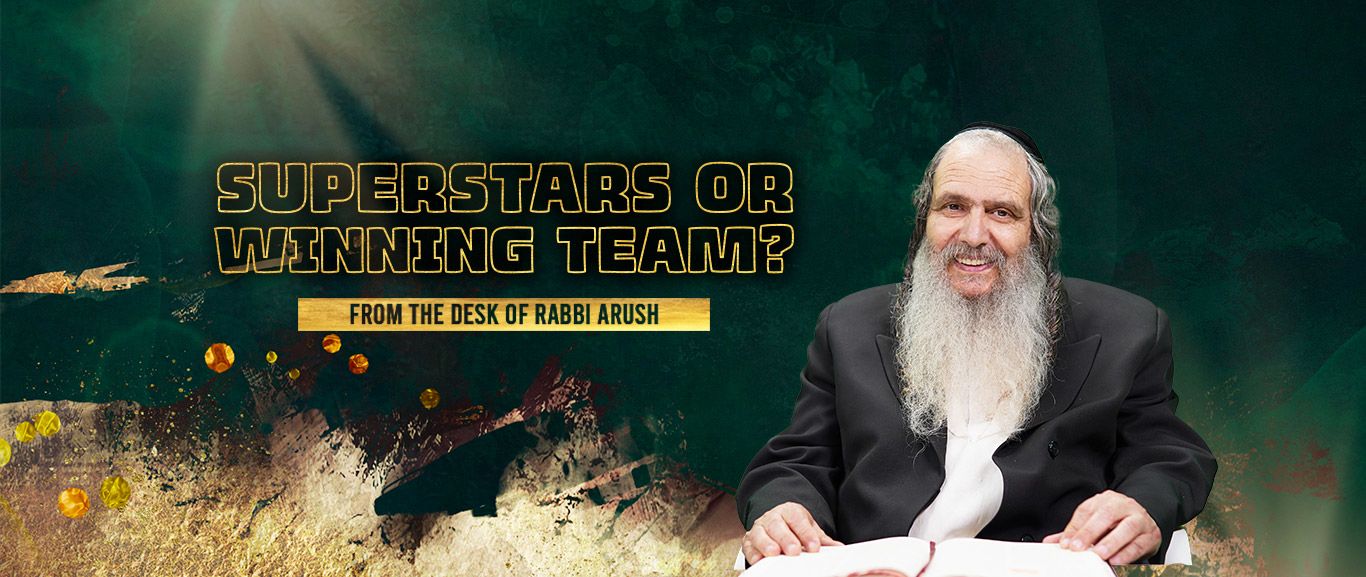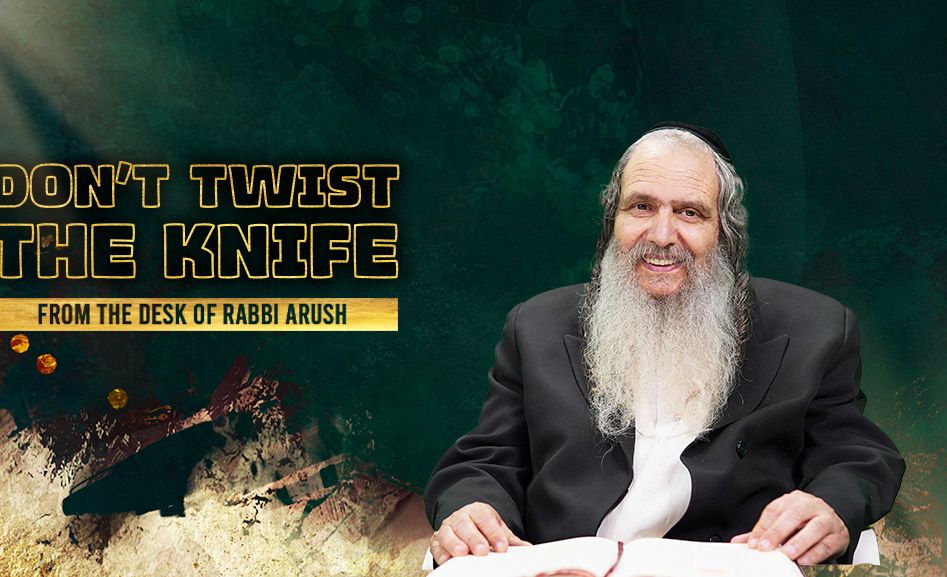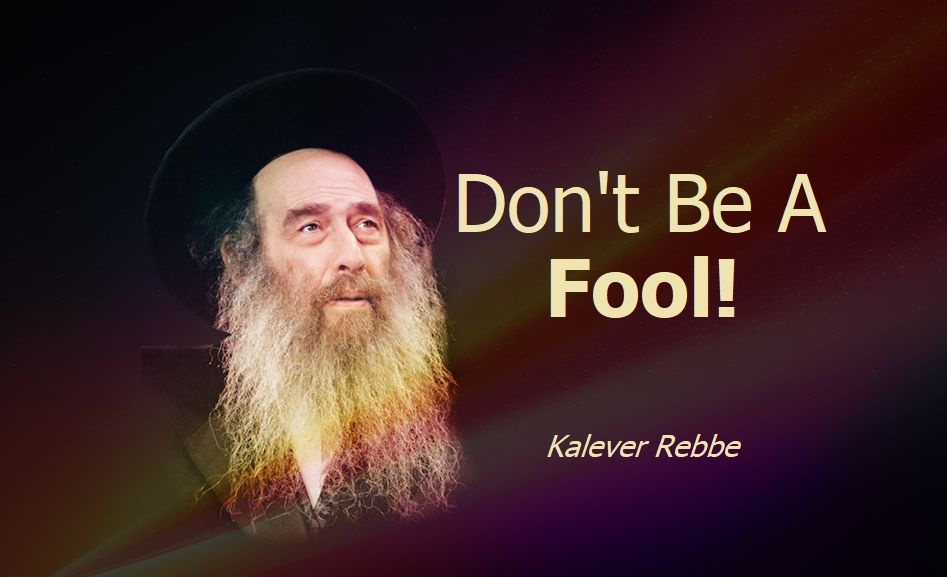
Superstars or a Winning Team?
The Mishkan in the desert and the Beit HaMikdash in ancient Jerusalem are more relevant today than ever! They are the model of successful lives that are joined together for a common purpose in Creation. We are a nation of souls all connected one to each other.

The Only Way to Succeed
If we take any aspect of our lives and examine it, we will see that the secret of success among those who really and truly wish to succeed big time, is not necessarily personal talents and abilities and not necessarily means and resources. And even when it comes to investment of time and energy, as extensive as it may be, that does not determine the outcome. We are all used to quoting all those motivational statements that the main thing is hard work, and, true, everything is important, both talent and hard work – but in a moment we will see that what really determines the outcome is something entirely different.
The secret of true success is the ability to work as a team, in other words, to join forces and work together for a joint goal; to know how to find the connecting factor, to settle disagreements, to combine the talents and abilities of all the players into one constructive force.
All Types of Successes
There are countless examples. Sport teams will never succeed, even if they include some very talented players, if they don’t know how to work as a team and see the general interest of the team as being above the personal interest of each player.
So too with work teams in almost every realm – the success is based on teamwork and on good relationships among the workers.
The great success of the Waze navigation software is not necessarily its sophistication, but rather the ability to use the wisdom of the masses, with every user contributing effortlessly and endlessly to the general functioning of the program, and, on the way, contributing to the correct navigation of millions of people all over the world.
When it comes to money, as well, the largest investment firms are not those built around single financiers, but those based on citizens’ pension or insurance funds. A few hundreds of shekels belonging to thousands and millions come together and create an immense force of initiative and economic growth.
All the more so, when it comes to interpersonal relationships and marital life, which are based solely on oneness and working together.
A good teacher not only knows how to teach, but also knows how to connect all the students.
Even when it comes to learning Torah, one student, talented though he may be, needs a chavruta – a learning partner, and learning in a group is vastly different from learning by oneself.
A Basic Law of Nature
All successes in the world are the result of cooperation, and the greater the cooperation and the unity, the greater the success. This is an inseparable part of the existence of the world, of society and of any healthy and proper process of growth. From the negative angle, the greatest destruction in the world comes as the result of internal and external wars, which can make families, communities – and empires! – crumble and fall apart.
From this we can understand the purpose and the main point of the Torah, for the Torah is a clear revelation of what the Creator wants from His world.
We see in the world that the Creator wants unity of purpose and connection, and, so too, we can see this in the Torah. There are an infinite number of sources that show us and teach us that Hashem does not yearn for the courage of the single person, or the talents of separate people. He wants one united nation that will serve the Creator as a nation, in spite of the differences between the various tribes, families and spiritual levels, and in spite of disagreements.
And therefore, too, when there is a halachic opinion held by one person as opposed to a halachic opinion held by many people, the ruling follows the majority, even if the single person is the greatest of the great.
There have been a great many tzaddikim, but Hashem was not looking for the lone superstars; He was looking for a winning team.
In It or In Them?
This explains the words of Chazal on parashat Tetzaveh, on the passuk: “They will make a sanctuary for Me and I will dwell in them.” Chazal ask, why does it say, “in them”, and not “in it”?
Because Hashem wishes to dwell in each and every Jew.
This is very puzzling, because that is the exact opposite of the simple understanding of the passuk, for Hashem is saying here quite clearly that He wishes to dwell in a certain place, namely, the Mishkan (Tabernacle), so it would seem that He does not wish to be “scattered” all over and in all human beings, so how do Chazal learn the exact opposite of this from this passuk?
And another question: If Hashem wants to dwell within each and every one of the Jewish people, then why does one need the Mishkan? What does that do for us? Hashem is dwelling in my heart, and your heart, and the heart of each and every one of us, so there is no need for a defined location for the Shechina to dwell, is there?
There is also a more general question: If the construction of the Mishkan was a one-time historical event, a mitzvah intended to be observed for a certain period of time, why does the Torah go into such detail, at such great length, regarding the process of its construction, devoting five parashot to it? Is this just a historical story about a beautiful and expensive structure that existed once upon a time?
Each One of Us is a Small Light
But Chazal wished to enlighten us as to Hashem’s intention in the building of the Mishkan.
Chazal didn’t want us to think mistakenly that the Creator wants to limit His presence to a certain place, for Hashem certainly dwells everywhere, and is not limited to any place exclusively. Of course, He dwells in each and every one of us, and He is close to all those who call out to Him, be they on any spiritual level. “If I ascend to heaven, You are there; if I make my bed in the lowest depths, You are there.” Even in the valley of death, Hashem is with you, and He creates light for those who sit in darkness.
But Hashem doesn’t want us to make the opposite mistake, either. Hashem doesn’t want us to think that since Hashem is with me, and I have a direct, personal connection with the Creator, then I don’t need anyone else, and “I can manage on my own.” No, no.
Hashem wants all Jews to feel all the time that they are actually part of a large team engaged in construction, donation and joint action. Each and every one gives something of himself or herself, of his resources, of his talents.
Every person makes a small effort towards a very large goal.
We are all pieces in one Mishkan.
From this we learn that the building of the Mishkan is an eternal task for all of us.
The Mishkan – More Relevant Than Ever
Hashem is certainly with you in any situation, and dwells with you, and any personal mitzvah of yours is undoubtedly extremely important. But the goal of the Torah is not that you will take “first place” in serving Hashem, or that you should be a spiritual superstar, but, rather, the goal is that all the Jewish people will blossom, so that the Shechina will dwell upon the entire Jewish nation – as a nation.
So, Hashem certainly dwells by every Jew, but he wants the goal of each and every one of us to be that He will dwell by all of us as one nation.
We shouldn’t be servants of Hashem, scattered and separated, but, rather, one body; all our mitzvahs should create one Mishkan, and all our prayers should unite and become one mass of purity and holiness.
Therefore, when there was baseless hatred – sinat chinam – the Beit Hamikdash was destroyed. Because a temple is not a house and it is not a workplace, and it is not even a place of prayer. The Beit Hamikdash represents the unity and cooperation of all of us, the responsibility of all of us, and the deep connection we all have with each other.
And when this connection is damaged and done away with – the House of G-d is actually considered to be destroyed already, even though it still exists physically, and that is why Titus was told: “You destroyed a destroyed house.”
And so, the sections about the Mishkan are relevant to us on a daily basis, even now, when we have no Beit Mikdash, because they give us a very clear direction regarding what Hashem wants from us: Hashem wants each and every one of us to learn Torah and observe the mitzvot and serve Him – but mainly that the Jewish People will always be foremost in our minds, that we should never view ourselves as private individuals, as separate from the general public, but, rather, always understand that each and every one of us is part of a team, connected with all other Jewish souls; and we should always pray for them all.










Tell us what you think!
Thank you for your comment!
It will be published after approval by the Editor.